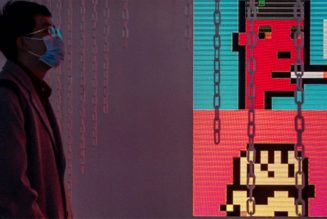Applying to an elite middle school sounds like a stressful experience, and I’m sure COVID-19 doesn’t help. With things like open houses, campus tours, and in-person interviews off the table, applicants have fewer chances to experience their prospective schools — and admissions offices have fewer chances to meet their prospective students.
One San Jose private school has come up with a unique solution: The Harker School, self-described as “one of the nation’s top college prep schools,” is putting teams of sixth grade applicants through a virtual escape room. Over a Zoom call, the 11-year-olds work together to solve a series of Harker-themed puzzles, and admissions officers observe their behavior.
Harker let me go through the game myself, alongside a friend of mine who’s an experienced escape room artist. I imagine that, to an 11-year-old, the process may have been stressful and somewhat dystopian. But for me, a grown-up, it was a heck of a lot of fun.
The game came from a collaboration between Harker and Paruzal, a Denver-based company that specializes in live-hosted online escape rooms. Paruzal’s games take place in all kinds of settings, from Bruce Springsteen concerts to coffee shops and pizzerias, with high stakes, including “Can you find the backup coffee beans before the food critic arrives?” “Will you be able to build the bobblehead to unlock your office door on time?” and “Will you get to meet Bruce Springsteen in his dressing room before the journalist arrives and interrupts you?” They’re low-tech operations, though: a Zoom call, a series of PowerPoint-esque slides, and a game master who leads the charge.
Harker isn’t the first institution to turn to pared-down online puzzles as an educational tool. Escape rooms built from Google Forms have been popular among teachers and librarians since the start of the COVID-19 pandemic. It’s the sort of exercise ready-made for assessing teamwork and problem-solving skills, as well as engaging kids who are stuck at home.
The sixth grade game, called “The Annual Picnic,” was designed to evaluate how a student thinks on their feet. “There’s really no good way to practice playing a game,” says James Warner, Paruzal’s owner. “You’re really showing more of your true self.”
:no_upscale()/cdn.vox-cdn.com/uploads/chorus_asset/file/22346223/TAPISW_09.jpg)
The scenario was as follows: we were put in the shoes of Harker School sixth graders setting up a booth for the school’s annual picnic. (This is a real event Harker puts on every year. As described, it sounds like a massive operation that my public middle school could not have pulled off in its wildest dreams.) The supplies necessary to construct this booth were locked in some lockers, however, and the combinations were hidden in various parts of Harker’s library. To “escape” from the library, we had to find them.
My teammate and I began our search. We were shown crudely drawn locations like a desk, a fridge, and a bookcase. We quibbled between ourselves over which location to investigate, then informed the game master of our decision. He swapped to the appropriate slide.
In this manner, we embarked on our quest across the library, finding the combinations we sought in chocolate chip cookies, sausages, old recipes, cryptic posters, and other various items. One puzzle involved some arithmetic on the number of pages in a stack of books. A jar contained cookies with varying numbers of chips, which led us to another combination. Some of the puzzles were busywork; a picture of a bunch of owls that hung on the wall ended up being a Morse Code message that we had to grind out. Others were legitimately tricky; we spent several minutes agonizing over what to do with a bag of sausages before realizing we should tell the game master to open the bag.
My teammate and I finished Harker’s escape room in just under 30 minutes. Teams of applicants average around 33 minutes — so we did beat the average 11-year-old, although not by a lot. (In our defense, my ego wouldn’t allow me to ask for too many hints. They’re technically unlimited in Harker’s game. Game masters also have strategies for speeding the kids along. “We have some say in how long the game is based on how forcefully I recommend that they ask for a hint,” says Warner.)
Based on our score, Warner believes my teammate and I would be strong candidates for Harker’s sixth grade class. (He noted that while I seemed like more of a leader, my teammate had more useful ideas. Fair enough!)
:no_upscale()/cdn.vox-cdn.com/uploads/chorus_asset/file/22346225/TAPISW_23.jpg)
Of course, the score isn’t the only factor. Were we Harker applicants, admissions officers would have been watching our interactions closely. “You take notes on the various performances to identify a student that screams at one of their counterparts in the game, or maybe there’s somebody who’s building consensus,” Warner says.
There are also some Easter eggs built into the game that can help differentiate students with sophisticated knowledge. One of the locker combinations was “24601” — “Ah, Les Mis,” I remarked upon discovery. That’s apparently something Harker is watching for. “It’s a way to help the staff … get a feel for how broad an applicant’s experience is,” Warner says.
:no_upscale()/cdn.vox-cdn.com/uploads/chorus_asset/file/22347850/TAPISW_20.jpg)
The escape room I completed has been retired — the next batch of applicants will get a different one — but Paruzal plans to keep the game on the backburner as a tool, even as in-person interviewing eventually resumes.
In some ways, Harker’s game replicates aspects of the pre-pandemic admissions process — the campus tour, the open house. “Before the pandemic, I know some [secondary schools] would observe students in a group setting when they were doing a visit to see how they reacted,” says admissions expert Eric Nichols, VP for Enrollment Management at Loyola University Maryland. “That’s why they’re doing the virtual escape room: the chance to observe students to see how they react to a situation.”
But some of the quirks we displayed during our game strike me as traits that would be difficult to draw out through even the traditional pre-pandemic process. I’ll admit that when I conceive of a Silicon Valley private school seeking diplomatic sixth graders with knowledge of 19th century French literature, I’m tempted to roll my eyes. But within an application file of grades, standardized test scores, and other sorts of metrics that can be gamed with camps and tutors, perhaps escape room acumen could help exceptional students without exceptional numbers stand out.
“Nothing’s going to replace grades, but for students who are on the borderline academically, those softer skills can help an admission office decide who they might want to take a chance on,” Nichols says. “It puts everyone on an equal playing field.”









